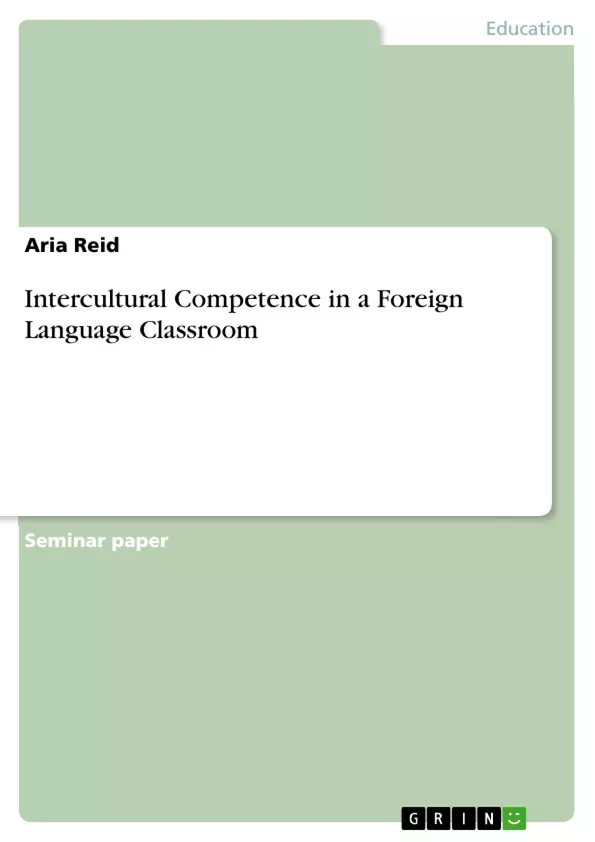Intercultural competence has become the key competence of the 21th century. All German Bundesländer have added this term to their school curriculum and included it in their foreign language learning classrooms. Culture is conceived through language and by that an important element of the foreign language learning process. Communicating with someone from a different part of the world is not only based on knowing his or her language but also on understanding where this person comes from. Therefore it has become essential to help foreign language learners to create a cultural profile as an orientation and a guideline for the diverse cultures of their target language. In particular this is mostly achieved through the work with authentic literary texts and its influence on the learner’s knowledge and thought.
By regarding language as a “[…] social practice, culture becomes the very core of language teaching.” (Kramsch 1993, 8) and has its main goal in conveying tolerance and acceptance for foreign cultures and their way of life.
Inhaltsverzeichnis (Table of Contents)
- Thesis
- The importance of intercultural competence
- Literary texts and intercultural competence
- Conclusion
Zielsetzung und Themenschwerpunkte (Objectives and Key Themes)
This paper investigates the significance of intercultural competence in today's multicultural society and explores how literary texts can be utilized to cultivate such competence in a foreign language (FL) classroom.
- The growing importance of intercultural competence in a globalized world.
- The role of culture in language learning and communication.
- The challenges and opportunities of cultural differences in communication.
- The potential of literary texts to foster intercultural understanding.
- The development of intercultural competence through the analysis and interpretation of authentic literary works.
Zusammenfassung der Kapitel (Chapter Summaries)
- Thesis: This chapter outlines the central argument of the paper, highlighting the importance of intercultural competence in foreign language learning and the role of literary texts in developing this skill. It emphasizes the need for learners to develop a cultural profile and understand the diverse cultures associated with their target language.
- The importance of intercultural competence: This chapter explores the increasing multiculturalism and internationalization that students face, emphasizing the need to understand and navigate cultural differences. It defines culture as a way of life, highlighting the importance of sensitizing learners to the norms and values of different cultures. The chapter discusses the impact of stereotypes on intercultural communication and the need for students to develop open-mindedness and critical thinking skills.
- Literary texts and the intercultural competence: This chapter delves into the role of literary texts in developing intercultural competence. It argues that literature can help learners understand how people from different cultures communicate and provides insights into their societies. The chapter emphasizes the importance of understanding the relationship between language and culture, acknowledging the diverse cultural contexts within a single language.
Schlüsselwörter (Keywords)
This paper focuses on the key concepts of intercultural competence, foreign language learning, cultural differences, communication, and the role of literary texts in developing intercultural understanding. It emphasizes the importance of navigating cultural nuances and promoting tolerance and respect for diverse cultures within the context of a foreign language classroom.
Frequently Asked Questions
Why is intercultural competence considered a key skill for the 21st century?
In a globalized world, communicating effectively requires not just language skills, but an understanding of the cultural background and values of the conversation partner.
How can literary texts help develop intercultural competence?
Authentic literary works provide insights into how people from different cultures think, communicate, and live, fostering empathy and tolerance.
What is the relationship between language and culture in the classroom?
Culture is conceived through language; therefore, language teaching must include cultural nuances to convey a complete understanding of the target language.
How do stereotypes affect intercultural communication?
The paper discusses how stereotypes can hinder communication and emphasizes the need for students to develop open-mindedness and critical thinking to overcome them.
What is the main goal of teaching culture in foreign language learning?
The primary goal is to promote tolerance, acceptance, and respect for foreign cultures and their diverse ways of life.
- Citation du texte
- Aria Reid (Auteur), 2012, Intercultural Competence in a Foreign Language Classroom, Munich, GRIN Verlag, https://www.grin.com/document/193590



